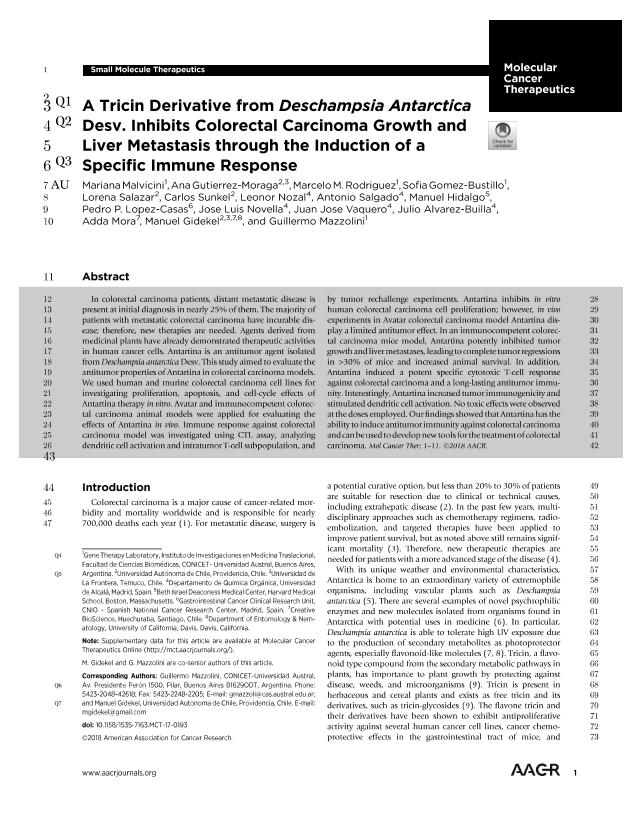Mostrar el registro sencillo del ítem
dc.contributor.author
Malvicini, Mariana

dc.contributor.author
Gutiérrez Moraga, Ana

dc.contributor.author
Rodriguez, Marcelo Maximiliano

dc.contributor.author
Gomez Bustillo, Sofia

dc.contributor.author
Salazar, Lorena
dc.contributor.author
Sunkel, Carlos
dc.contributor.author
Nozal, Leonor
dc.contributor.author
Salgado, Antonio
dc.contributor.author
Hidalgo, Emanuel
dc.contributor.author
Lopez Casas, Pedro P.
dc.contributor.author
Novella, Jose Luis
dc.contributor.author
Vaquero, Juan Jose
dc.contributor.author
Alvarez Builla, Julio
dc.contributor.author
Mora, Adda
dc.contributor.author
Gidekel, Manuel

dc.contributor.author
Mazzolini Rizzo, Guillermo Daniel

dc.date.available
2020-02-12T20:00:19Z
dc.date.issued
2018-05
dc.identifier.citation
Malvicini, Mariana; Gutiérrez Moraga, Ana; Rodriguez, Marcelo Maximiliano; Gomez Bustillo, Sofia; Salazar, Lorena; et al.; A tricin derivative from deschampsia antarctica desv. Inhibits colorectal carcinoma growth and liver metastasis through the induction of a specific immune response; American Association for Cancer Research; Molecular Cancer Therapeutics; 17; 5; 5-2018; 966-976
dc.identifier.issn
1535-7163
dc.identifier.uri
http://hdl.handle.net/11336/97334
dc.description.abstract
In colorectal carcinoma patients, distant metastatic disease is present at initial diagnosis in nearly 25% of them. The majority of patients with metastatic colorectal carcinoma have incurable disease; therefore, new therapies are needed. Agents derived from medicinal plants have already demonstrated therapeutic activities in human cancer cells. Antartina is an antitumor agent isolated from Deschampsia antarctica Desv. This study aimed to evaluate the antitumor properties of Antartina in colorectal carcinoma models. We used human and murine colorectal carcinoma cell lines for investigating proliferation, apoptosis, and cell-cycle effects of Antartina therapy in vitro. Avatar and immunocompetent colorectal carcinoma animal models were applied for evaluating the effects of Antartina in vivo. Immune response against colorectal carcinoma model was investigated using CTL assay, analyzing dendritic cell activation and intratumor T-cell subpopulation, and by tumor rechallenge experiments. Antartina inhibits in vitro human colorectal carcinoma cell proliferation; however, in vivo experiments in Avatar colorectal carcinoma model Antartina display a limited antitumor effect. In an immunocompetent colorectal carcinoma mice model, Antartina potently inhibited tumor growth and liver metastases, leading to complete tumor regressions in >30% of mice and increased animal survival. In addition, Antartina induced a potent specific cytotoxic T-cell response against colorectal carcinoma and a long-lasting antitumor immunity. Interestingly, Antartina increased tumor immunogenicity and stimulated dendritic cell activation. No toxic effects were observed at the doses employed. Our findings showed that Antartina has the ability to induce antitumor immunity against colorectal carcinoma and can be used to develop new tools for the treatment of colorectal carcinoma.
dc.format
application/pdf
dc.language.iso
eng
dc.publisher
American Association for Cancer Research

dc.rights
info:eu-repo/semantics/openAccess
dc.rights.uri
https://creativecommons.org/licenses/by-nc-sa/2.5/ar/
dc.subject
Colorectal carcinoma
dc.subject
Antartina
dc.subject
immunology
dc.subject.classification
Inmunología

dc.subject.classification
Medicina Básica

dc.subject.classification
CIENCIAS MÉDICAS Y DE LA SALUD

dc.title
A tricin derivative from deschampsia antarctica desv. Inhibits colorectal carcinoma growth and liver metastasis through the induction of a specific immune response
dc.type
info:eu-repo/semantics/article
dc.type
info:ar-repo/semantics/artículo
dc.type
info:eu-repo/semantics/publishedVersion
dc.date.updated
2019-10-17T14:58:48Z
dc.journal.volume
17
dc.journal.number
5
dc.journal.pagination
966-976
dc.journal.pais
Estados Unidos

dc.journal.ciudad
Philadelphia
dc.description.fil
Fil: Malvicini, Mariana. Universidad Austral. Facultad de Ciencias Biomédicas. Instituto de Investigaciones en Medicina Traslacional. Consejo Nacional de Investigaciones Científicas y Técnicas. Oficina de Coordinación Administrativa Parque Centenario. Instituto de Investigaciones en Medicina Traslacional; Argentina
dc.journal.title
Molecular Cancer Therapeutics

dc.relation.alternativeid
info:eu-repo/semantics/altIdentifier/url/https://mct.aacrjournals.org/content/17/5/966
dc.relation.alternativeid
info:eu-repo/semantics/altIdentifier/doi/http://dx.doi.org/10.1158/1535-7163.MCT-17-0193
Archivos asociados
